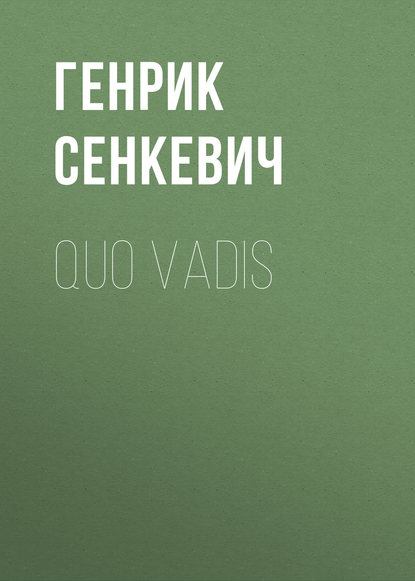По всем вопросам обращайтесь на: info@litportal.ru
(©) 2003-2025.
✖
Quo Vadis
Настройки чтения
Размер шрифта
Высота строк
Поля
“I swear to thee, lord, that I am writing a hymn.”
“Then thou wilt write it at night. Beg inspiration of Diana, who, by the way, is a sister of Apollo.”
Chilo dropped his head and looked with malice on those present, who began to laugh again. Cæsar, turning to Senecio and Suilius Nerulinus, said, —
“Imagine, of the Christians appointed for to-day we have been able to finish hardly half!”
At this old Aquilus Regulus, who had great knowledge of everything touching the amphitheatre, thought a while, and said, —
“Spectacles in which people appear sine armis et sine arte last almost as long and are less entertaining.”
“I will command to give them weapons,” answered Nero.
But the superstitious Vestinius was roused from meditation at once, and asked in a mysterious voice, —
“Have ye noticed that when dying they see something? They look up, and die as it were without pain. I am sure that they see something.”
He raised his eyes then to the opening of the amphitheatre, over which night had begun to extend its velarium dotted with stars. But others answered with laughter and jesting suppositions as to what the Christians could see at the moment of death. Meanwhile Cæsar gave a signal to the slave torch-bearers, and left the Circus; after him followed vestals, senators, dignitaries, and Augustians.
The night was clear and warm. Before the Circus were moving throngs of people, curious to witness the departure of Cæsar; but in some way they were gloomy and silent. Here and there applause was heard, but it ceased quickly. From the spoliarium creaking carts bore away the bloody remnants of Christians.
Petronius and Vinicius passed over their road in silence. Only when near his villa did Petronius inquire, —
“Hast thou thought of what I told thee?” “I have,” answered Vinicius.
“Dost believe that for me too this is a question of the highest importance? I must liberate her in spite of Cæsar and Tigellinus. This is a kind of battle in which I have undertaken to conquer, a kind of play in which I wish to win, even at the cost of my life. This day has confirmed me still more in my plan.”
“May Christ reward thee.”
“Thou wilt see.”
Thus conversing, they stopped at the door of the villa and descended from the litter. At that moment a dark figure approached them, and asked, —
“Is the noble Vinicius here?”
“He is,” answered the tribune. “What is thy wish?”
“I am Nazarius, the son of Miriam. I come from the prison, and bring tidings of Lygia.”
Vinicius placed his hand on the young man’s shoulder and looked into his eyes by the torchlight, without power to speak a word, but Nazarius divined the question which was dying on his lips, and replied, —
“She is living yet. Ursus sent me to say that she prays in her fever, and repeats thy name.”
“Praise be to Christ, who has power to restore her to me,” said Vinicius. He conducted Nazarius to the library, and after a while Petronius came in to hear their conversation.
“Sickness saved her from shame, for executioners are timid,” said the youth. “Ursus and Glaucus the physician watch over her night and day.”
“Are the guards the same?”
“They are, and she is in their chamber. All the prisoners in the lower dungeon died of fever, or were stifled from foul air.”
“Who art thou?” inquired Petronins.
“The noble Vinicius knows me. I am the son of that widow with whom Lygia lodged.”
“And a Christian?”
The youth looked with inquiring glance at Vinicius, but, seeing him in prayer, he raised his head, and answered, —
“I am.”
“How canst thou enter the prison freely?”
“I hired myself to carry out corpses; I did so to assist my brethren and bring them news from the city.”
Petronius looked more attentively at the comely face of the youth, his blue eyes, and dark, abundant hair.
“From what country art thou, youth?” asked he.
“I am a Galilean, lord.”
“Wouldst thou like to see Lygia free?”
The youth raised his eyes. “Yes, even had I to die afterwards.”
Then Vinicius ceased to pray, and said, —
“Tell the guards to place her in a coffin as if she were dead. Thou wilt find assistants to bear her out in the night with thee. Near the ‘Putrid Pits’ will be people with a litter waiting for you; to them ye will give the coffin. Promise the guards from me as much gold as each can carry in his mantle.”
While speaking, his face lost its usual torpor, and in him was roused the soldier to whom hope had restored his former energy.
Nazarius was flushed with delight, and, raising his hands, he exclaimed,
“May Christ give her health, for she will be free.”
“Dost thou think that the guards will consent?” inquired Petronius.
“They, lord? Yes, if they know that punishment and torture will not touch them.”
“The guards would consent to her flight; all the more will they let us bear her out as a corpse,” said Vinicius.
“There is a man, it is true,” said Nazarius, “who burns with red-hot iron to see if the bodies which we carry out are dead. But he will take even a few sestertia not to touch the face of the dead with iron. For one aureus he will touch the coffin, not the body.”
“Tell him that he will get a cap full of aurei,” said Petronius. “But canst thou find reliable assistants?”
“I can find men who would sell their own wives and children for money.”
“Where wilt thou find them?”

















